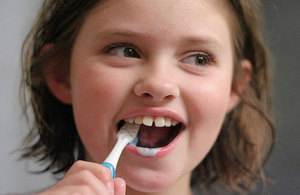New PHE survey finds 12% of 3 year olds have tooth decay
This is the first national survey of the oral health of 3 year old children in England.

The survey, published today (30 September) by Public Health England (PHE), found that those children affected had an average of 3 decayed teeth due to the disease.
According to the survey, there was a dramatic variation of tooth decay prevalence ranging from 2% to 34% across the country. However the large majority of children (88%) in this age group have no decay at all. This reflects trends of significant improvements in dental health since the introduction of fluoride toothpaste in 1976.
Tooth decay is caused by consuming too many sugary foods and drinks too often. Unless this lifestyle issue is addressed, there is a much higher risk of further tooth decay in permanent adult teeth and throughout later life. It can be prevented by eating a healthy balanced diet which limits the amount of foods and drinks high in sugar, and also by brushing teeth for 2 minutes twice a day, once before bed, using fluoride toothpaste.
In some cases a particular type of decay called ‘Early Childhood Caries’ was found by the survey. This affects the upper front teeth spreading rapidly to other teeth and is related to the consumption of sugary drinks in baby bottles or sipping cups. There is a much higher risk of tooth decay if sugary drinks are given to children so they should be avoided. Breast feeding provides the best nutrition for babies and the best drinks for young children aged 1 to 2 are full fat milk and water and from 2 years old, semi-skimmed milk and water as long as they are a good eater.
This is the first time a survey of this age group has been carried out nationally so the findings form a baseline from which PHE can continue to collect data. This will enable us to monitor trends and target resource appropriately to help local authorities tackle tooth decay in children.
To keep children’s teeth healthy, PHE is encouraging parents and carers of young children to:
- reduce both the amount and how often sugary foods and drinks are given to them
- not add sugar to weaning foods or drinks
- aim to introduce drinking from a free-flow cup from 6 months of age and stop feeding from a bottle from 12 months of age
- start brushing children’s teeth as soon as the first tooth appears and supervise their tooth brushing until they are 7 or 8 years old. Brush children’s teeth twice daily, including just before bed, using a fluoride toothpaste
- from the age of 3, use only a pea sized amount of fluoride toothpaste, for younger children a smear
- use only sugar-free medicines
Dr Sandra White, Director of Dental Public Health at PHE, said:
While there have been significant improvements to the nation’s oral health, some areas still experience problems with tooth decay among young children. Tooth decay is an entirely preventable disease, which can be very painful and even result in a child having teeth removed under general anaesthetic, which is stressful for children and parents alike.
Thankfully, tooth decay in children can be prevented by following a healthy lifestyle; by parents and carers reducing the amount of sugary foods and drinks they give their children and supporting them to brush their teeth twice a day with a fluoride toothpaste, especially just before bedtime. It is also important to take your child to the dentist, which is free of charge for children, as the dentist will be able to advise you about how to keep your child’s teeth and gums healthy.
Notes to editors
- PHE exists to protect and improve the nation’s health and wellbeing and reduce health inequalities. It does this through advocacy, partnerships, world-class science, knowledge and intelligence, and the delivery of specialist public health services. PHE is an operationally autonomous executive agency of the Department of Health.
- The survey ‘Dental public health epidemiology programme, oral health survey of 3-year-old children 2013’ provides information on the prevalence and severity of dental decay (caries) in 3-year-old children attending state or privately funded nurseries, nursery classes attached to schools and playgroups. A total of 53,640 children were examined in 145 upper tier local authorities, representing 8% of the total age 3 population across England. Further reports will be produced and available online.
- From 1 April 2013 local authorities became responsible for assessing the oral health needs of their local population, developing oral health strategies and commissioning oral health improvement programmes. PHE are providing support to local authorities and have recently published 2 related guidance documents; ‘Local authorities improving oral health: commissioning better oral health for children and young people, an evidence-informed toolkit for local authorities’ and ‘Delivering better oral health: an evidence based toolkit for prevention’ 3rd edition, which provides evidence based interventions and new advice on how dental health professionals can improve and maintain the oral and general health of their patients.
- Cows’ milk shouldn’t be given as a drink to babies until they are 12 months old. Whole milk should be given to children until they are 2 years old, as they need the extra energy and vitamins it contains. Semi-skimmed milk can be introduced once your child is 2 years old, as long as they’re a good eater and they have a varied diet. Skimmed and 1% milk is not suitable for children under 5, as they don’t contain enough calories.